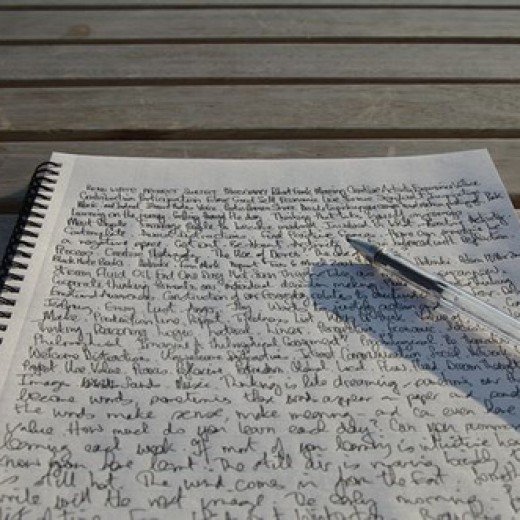Three Days to More Intense and Focused Writing by Wyatt Bessing
 Welcome back to monthly columnist, Wyatt Bessing. A writing coach and teacher, author, Wyatt Bessing shares his fun take on games, play, and how they help our writing. This month Wyatt gives us tips on how in three days you can write more intense and focused writing. Enjoy!
Welcome back to monthly columnist, Wyatt Bessing. A writing coach and teacher, author, Wyatt Bessing shares his fun take on games, play, and how they help our writing. This month Wyatt gives us tips on how in three days you can write more intense and focused writing. Enjoy!
***
I find that if I’m too relaxed in my chair, slouching or sinking down, I automatically enter a relaxed state of mind, a kind of fuzziness that might momentarily aid the flexibility of my thoughts, but soon becomes a detriment to focus. I want my words sharp and precise, well-chosen and passionate. Despite the stories of famous writers who did most of their writing in bed, I find that a strong posture stimulates stronger writing.
It makes sense, doesn’t it? Speakers don’t delivered their impassioned arguments sitting down. Dancers focus their attention into creating specific body imagery. Even painters, perhaps the closest creative analog to writers, work with very precise movements that foster the brain-body connection.
I’m not saying I want to write standing up, but having my feet firmly on the ground, my head in a relaxed yet alert position, and my attention focused as sharply as possible on my words, without distraction, is essential to my best writing. Sometimes I write by hand, scribbling out my first drafts in a journal, and this makes a better brain-body connection for me than typing. I must focus more on the movement of my fingers, on the visceral feeling of the pen gliding on the paper. Even with the distraction of writing in a cafe or other public place – perhaps even more with this distraction because it forces my focus closer to my work while providing visual stimulation during moments of rest – writing in a journal connects myself to my words in an immediate way. I’ve made these words appear on real paper, not as scattered electrons that disappear when the monitor goes off.
I like to set a timer when I write, to challenge myself to write for ten minutes without stopping, putting all this focus to the test. When I feel blocked, I look up and grab a color or movement from around me and put that into the rough draft. It might even find its way into the final version later.
Try this: Set a timer for ten minutes and just go, let it all go and write as quickly as possible, not letting your hand off the page. Sometimes you’ll verge into dangerous territory, because when you let it all go your unconscious may explore ideas and memories that make you uncomfortable. That’s perfectly okay! Write it all down without stopping or censoring yourself. You’re training the censor to stay away from your creative process. The more often you practice this, the better you’ll become at generating wonderful surreal juxtapositions of imagery, and at exploring the shadowy underside of subjects, at looking at life completely. When you train yourself to take risks in writing, eventually your mind will just go there by itself.
As long as you practice with focus and effort, your writing will flourish. You’ll know you’re improving as a writer when your start automatically generating more unique and specific imagery, and more easily making connections tying back to your theme. But this takes practice, good form, and concentration. Think of yourself as an athlete, and don’t forget the brain-body connection in terms of health and exercise as well. A good physical exercise routine stimulates the mind with serotonin and dopamine, so exercising just before a writing session (or as a break in the middle) can really help you focus on creating those sharp words.
For the next three days, try creating variety in your writing routine, and end your writing sessions by journaling about how it felt.
Day One: Exercise just before writing, find a comfortable sitting position with your feet firmly on the floor, and begin and end your writing with a ten-minute freewriting exercise during which you’ll write as much as possible, not worrying about quality, only quantity, using a word of your choice as a prompt. Don’t forget to end by journaling about your experience.
Day Two: Exercise in the middle of your writing routine, preferably taking a break while the writing is really flowing, not when you feel blocked. Your mind will already be full of the imaginary landscapes and characters of your fiction, and the exercise will allow you to see more angles. For posture today, try something new – stand for a while, or sit in a lotus position, write in a journal if you’re used to typing; try something that might help your focus and attention. Again, remember to journal about your writing experience itself.
Day Three: Change your regular writing time (or set a specific time if you don’t have a regular one yet!). Now try to do something you enjoyed or found challenging from Day One or Two, but do it longer. Stand for ten minutes while writing, or freewrite for twenty minutes. When you journal about your writing practice at the end of Day Three, try to settle on a routine that will work for you in the long run, one you can do every day to help you focus and develop your craft through mindful practice.
***
 Wyatt Bessing is a writer, writing coach, and learning specialist. His stories and essays have appeared in Bedtime-Story.com, Outsider Ink, national educational assessment materials, and in the anthology Dance, Human Rights, and Social Justice. Through his workshops, website, and blog at wyattgbessing.com, he guides new and experienced writers in crafting more effective, expressive, and striking work. During the day, he works at Star Academy in San Rafael, teaching reading and comprehension skills to students with learning differences in elementary through high school. He lives in Santa Rosa, CA with his wonderful fiance and co-creator, Sarah Laugtug.
Wyatt Bessing is a writer, writing coach, and learning specialist. His stories and essays have appeared in Bedtime-Story.com, Outsider Ink, national educational assessment materials, and in the anthology Dance, Human Rights, and Social Justice. Through his workshops, website, and blog at wyattgbessing.com, he guides new and experienced writers in crafting more effective, expressive, and striking work. During the day, he works at Star Academy in San Rafael, teaching reading and comprehension skills to students with learning differences in elementary through high school. He lives in Santa Rosa, CA with his wonderful fiance and co-creator, Sarah Laugtug.







Absolutely fabulous advise. Right now I’m having a terrible time forcing myself to sit and write. I don’t feel where my characters should do. A writing routine is what I need, and exercise. I’ve let my health deteriorate, and it has affected my writing. Thanks for the three-day plan.
I tend to be a creative, out of the box thinker. But the one thing that I’m truly regimented about is my writing routine – two hours before work and two after. I wish I were more structured with my exercise routine, because I always feel better, more productive, and creative when I exercise. After all, you have to be in good shape to sit and focus without cramping or discomfort, to spend all that necessary time at your craft.
I tend to be a creative, out of the box thinker. But the one thing that I’m truly regimented about is my writing routine – two hours before work and two after. I wish I were more structured with my exercise routine, because I always feel better, more productive, and more creative after exercise. After all, you have to be in good shape to sit and focus without cramping or discomfort, to spend all that necessary time at your craft.